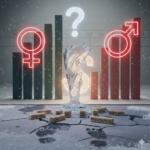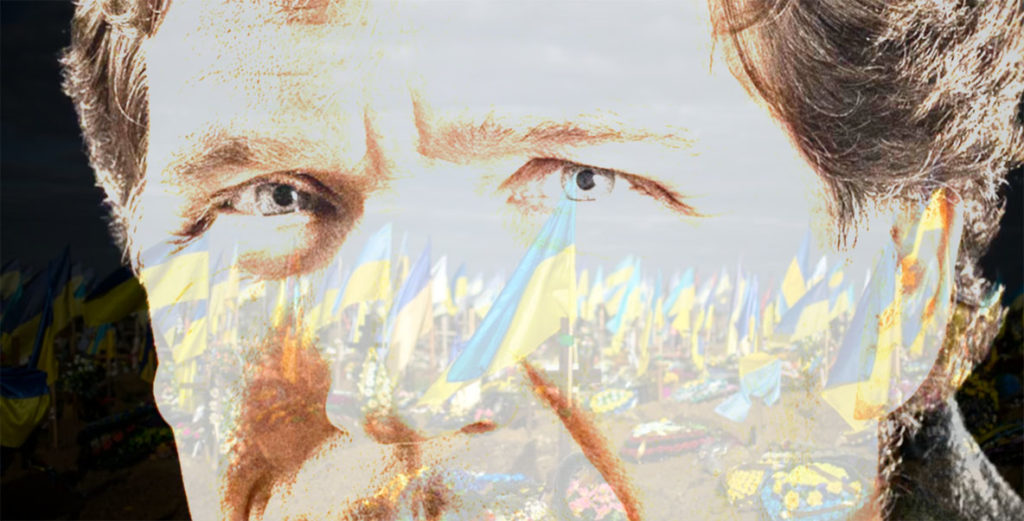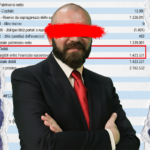Ukraine War
The war in Ukraine, which European chancelleries—spearheaded by Britain—seem intent on prolonging indefinitely, in apparent divergence from the White House’s intentions, is not only a horror from a humanitarian standpoint but might also conceal—and it’s highly probable that it does—a gigantic level of corrupt, criminal, and institutional activity across Europe.
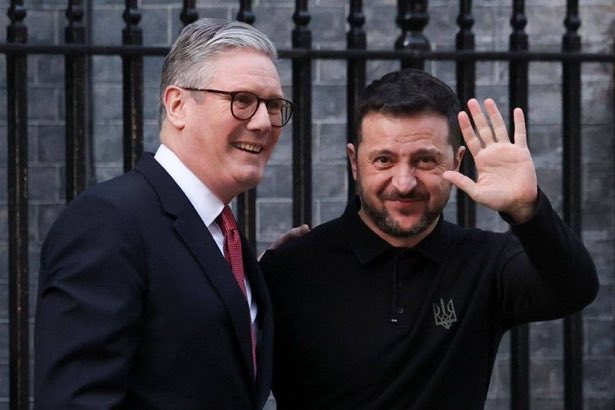
This nauseating cesspool, thriving on the corpses of Ukraine’s and Russia’s dead, could be teetering on the edge of exposure, thanks to the seismic jolt of the Trumpian revolution—a force that might bring down the entire edifice of Europe’s current power structure. Think of it like those massive buildings collapsing under controlled explosions: instead of micro-charges toppling them Twin Towers-style, we should envision a deluge of personal scandals tied to this still-hypothetical, immense sequence of corruption in managing funds for armaments and cash aid to Ukraine.
Every official responsible for the Ukraine issue within Europe’s power circles—nation by nation, party by party—could be implicated in a true cesspool of corruption, dripping with Ukrainian and Russian blood. It would be—indeed, it probably will be—a political earthquake of maximum destructive scale, one that would transform the face of European politics.
If we pause for a moment to reflect on the monstrous movement of money toward Ukraine—often untracked, shrouded in military secrecy, as seen in Italy, which has classified all its aid, thereby removing it from civil society’s oversight on corruption risks—we can easily imagine that this uncontrollable ocean of cash has aroused the most voracious predatory instincts among institutional and bureaucratic figures or operatives within the system.
Protected by a lack of visibility and the ability to cloak their transactions, these individuals have found themselves redistributing this immense public European wealth—meant for the civilian purposes of European societies—toward Ukraine and its ultra-corrupt oligarchies.
To grasp what this means and offer an example, we can recall the Qatargate scandal involving suitcases stuffed with cash tied to the Greek MEP. Now picture that multiplied thousands of times, involving thousands of politicians and mid-level power brokers within ministries, all engaged in the economic management of military support for Ukraine—where instead of measly suitcases, we’re talking about truckloads of money.
Something of this nature, absolutely emblematic of what might soon emerge from the corrupt cesspool of the Ukraine war, comes to mind as having already occurred with a hugely significant figure in American politics, someone I discussed in my second book, When Ukraine Invaded Iraq: The Pentagon’s Hands on History, published by Arianna Editrice in 2024, a 400-page exploration, precisely because this individual was deeply involved in U.S. foreign policy toward Ukraine.
On September 22, 2023, The New York Times published an article about Senator Robert Menendez, revealing his entanglement in a grave scandal over bribes linked to military aid for Egypt. Titled “Menendez Accused of Brazen Bribery Plot, Taking Cash and Gold,” the piece detailed how New Jersey’s governor called for Menendez’s resignation, leading the senator to step down as chairman of the Senate Foreign Relations Committee.
In my book, I observed the following: “Apparently, the senator—so active and determined at the time in meddling in Ukrainian politics—‘wielded significant influence over the amount of military aid provided by the United States to Egypt and other countries,’ as a second New York Times article reported, obviously in exchange for gold bars, a car, and cash that the FBI found stashed in bundles of bills hidden in closets and clothing.”
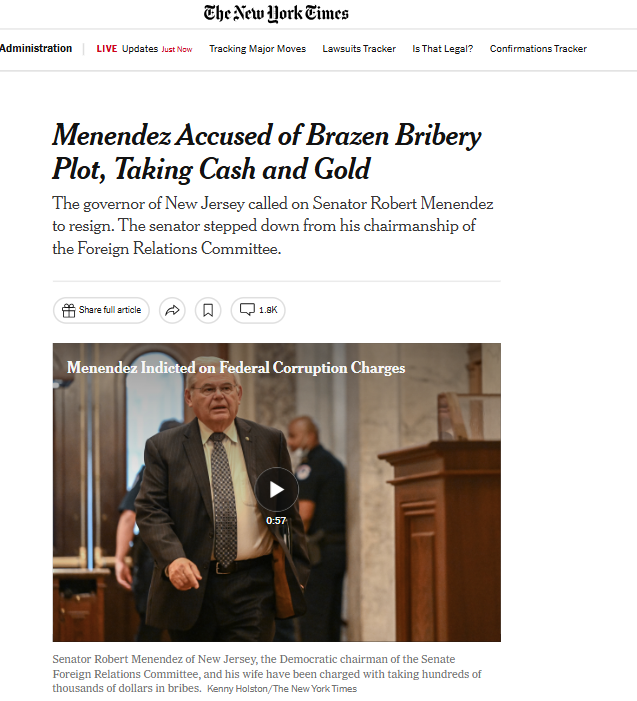
“These are the people who, as auxiliaries of the armed establishment, driving it toward catastrophe, have managed U.S. foreign policy in Ukraine over the past 20 years,” I wrote. “Surely, Victoria Nuland is entirely immune to the greed that ruined her colleague in Ukrainian affairs, the Honorable Menendez, and certainly acted—as we know, in the most despicable and criminal way, leading Ukraine by the hand toward civil war—for much nobler reasons.” (Page 297, appendix.)
This American senator, sentenced to nine years in prison for exerting influence over the quantity of military aid to Egypt, was one of the great protagonists of U.S. foreign policy in Ukraine. Arrested for corruption tied to Egypt’s military contracts, we can reasonably postulate—as I did in When Ukraine Invaded Iraq—that during the long years he dealt with Ukraine, the years of the civil war, the years of the coup, and so on, this man, corrupt to his very core, surely did in Ukraine—and perhaps far more—what he did in Egypt.
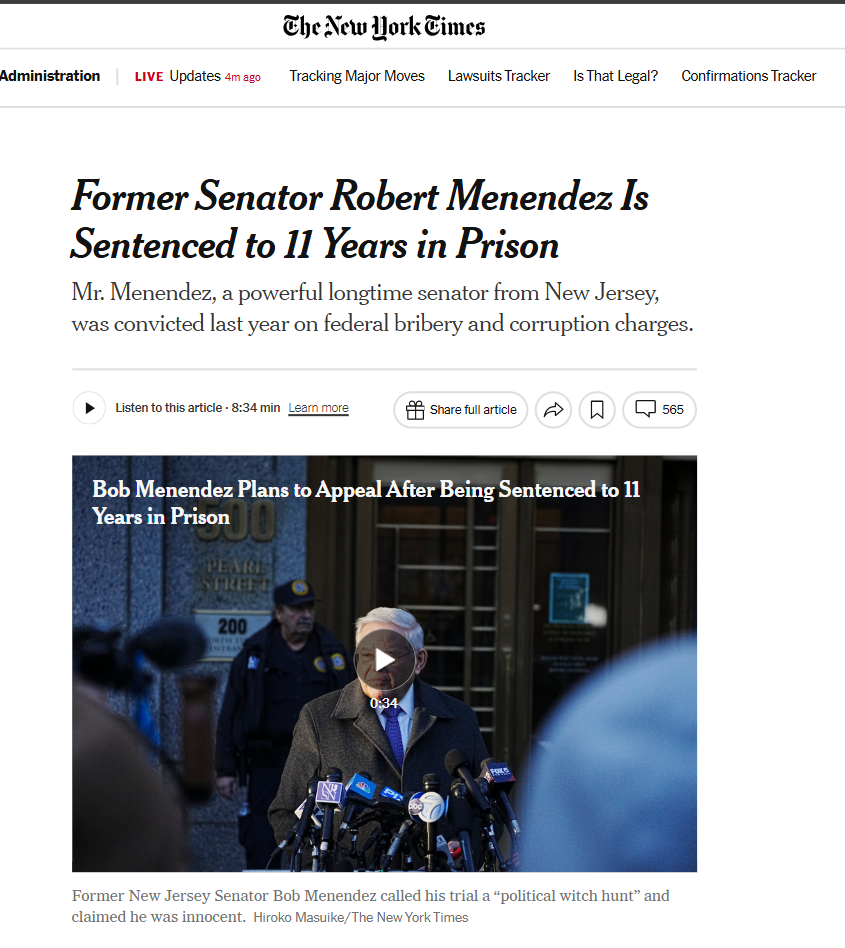
This scenario is hinted at, not so subtly, in a March 1 post on X by the renowned journalist Tucker Carlson—famous for being ousted from Fox News, where he was the frontman, before striking out on his own on the X platform, recently acquired by the brilliant tech multibillionaire Elon Musk. Musk’s policy shift, which Carlson thanked him for, has enabled an unprecedented level of free speech on the social network.
As an independent, Carlson gained fame as the first Western journalist to break the taboo of engaging with Russian President Vladimir Putin, interviewing him in a widely celebrated broadcast on his X channel, viewed by hundreds of millions worldwide. He later returned to Russia to interview Foreign Minister Lavrov.
Personally, I’ve always considered these two interviews as covert diplomatic missions by the entourage of President Trump’s power base—to which Carlson is notably close—evidently sensing their impending victory and beginning, months before the American elections, to prepare favorable ground for a meeting with Russia’s executive leadership. By shattering the West’s imposed isolation and breaking the glass dome encasing Russia, they aimed to build a framework for negotiation.
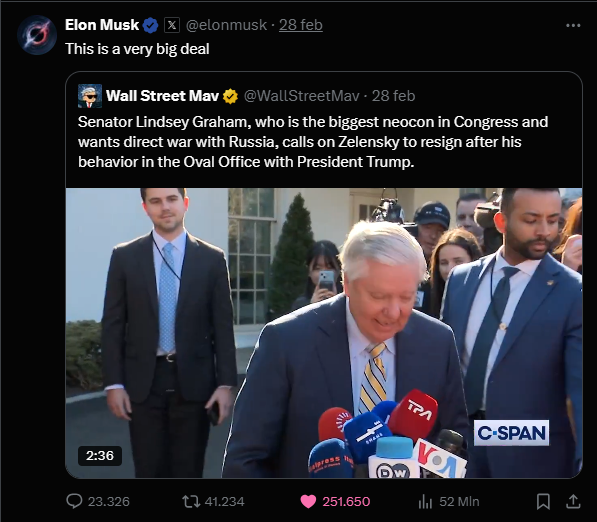
Thus, he’s a journalist who has played an absolutely pivotal role in the international scenarios now commanding global attention. His recent post, coming one day after one reposted by Elon Musk from Wall Street Mav—seen by 51 million people—featuring a snippet of Graham’s statements overlaid with the comment, “Senator Lindsey Graham, the biggest neoconservative in Congress and eager for direct war with Russia, calls for Zelensky to resign after his behavior in the Oval Office with President Trump,” reflects a series of reverberating posts on prominent accounts viewed by tens of millions.
Already seen by over 9 million of the nearly 16 million who follow Carlson, it states: “One of the most striking things about yesterday’s Zelensky press conference was Lindsey Graham’s reaction to it. The two are old friends, but Graham disavowed him within the hour. This was more than just transactional disloyalty. It was scapegoating.”
“Lindsey Graham knows what’s coming,” Carlson continued. “Over the past three years, with the tacit support of its Western patrons, the Ukrainian government has committed a remarkable number of serious crimes. The Ukrainians sold huge quantities of American weapons on the international black market at twenty cents on the dollar. These weapons are now in the hands of armed groups around the world, including Hamas, the Mexican drug cartels, and the forces now controlling Syria.“
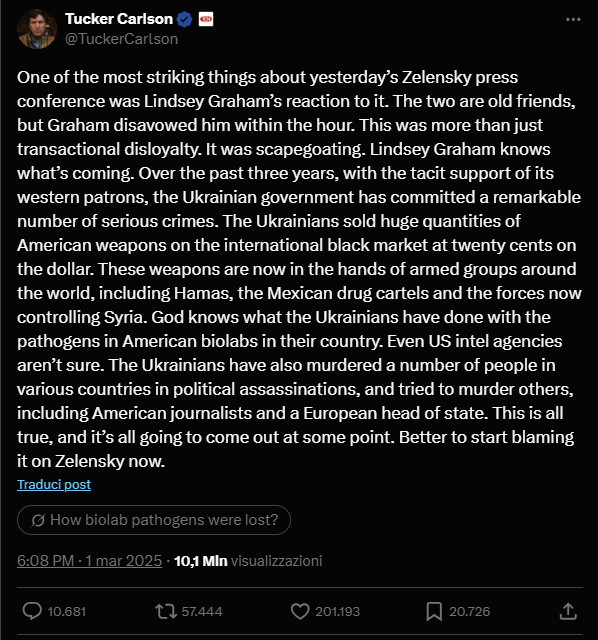
The March 1 post in which Tucker Carlson announces an impending international earthquake regarding corruption in Ukraine aid.
“God knows what the Ukrainians have done with the pathogens in American biolabs in their country,” he added. “Even U.S. intel agencies aren’t sure. The Ukrainians have also murdered a number of people in various countries in political assassinations and tried to murder others, including American journalists and a European head of state. This is all true, and it’s all going to come out at some point. Better to start blaming it on Zelensky now.”
In Carlson’s post, painted with a few almost Caravaggio-like strokes—more darkness than light—Ukraine is depicted not merely as an actor in dire straits amid conflict but as a sort of infected epicenter of illicit activities on a global scale, made possible by Western, particularly American, support.
Lindsey Graham’s reaction, described by Carlson as a swift about-face toward Zelensky, a longtime friend, is interpreted not as a mere act of political opportunism but as a signal that prominent figures in the American establishment are sensing the approach of an earthquake of enormous proportions. This suggests a central thesis of the text: the notion that a hidden truth—crimes, corruption, arms trafficking—is poised to erupt and topple those who have backed Ukraine over the past few years.
Graham, in this context, appears as a symbol of those trying to distance themselves before the collapse. The accusations leveled at the Ukrainian government are weighty and specific: from selling American weapons on the black market at bargain prices to their use by groups like Hamas and Mexican cartels, to the enigma of alleged biolabs and political assassinations.
This intervention, for which evidence is naturally awaited, could foreshadow something far more substantiated than a calculated provocation. The case of Robert Menendez, which I highlighted in When Ukraine Invaded Iraq—senator convicted for trading influence over military aid to Egypt for gold and cash after years of significant involvement in Ukrainian politics—lends enormous plausibility to Carlson’s accusations of a vast corrupt network tied to the Ukraine conflict.
To this, we add a further point of reflection: the reputation of European Commission President Ursula von der Leyen is also severely tarnished by the controversial matter of her personal agreements with Pfizer’s CEO for vaccine purchases, exacerbated by her destruction of related messages—an act that has sparked charges of opacity and abuse of power.
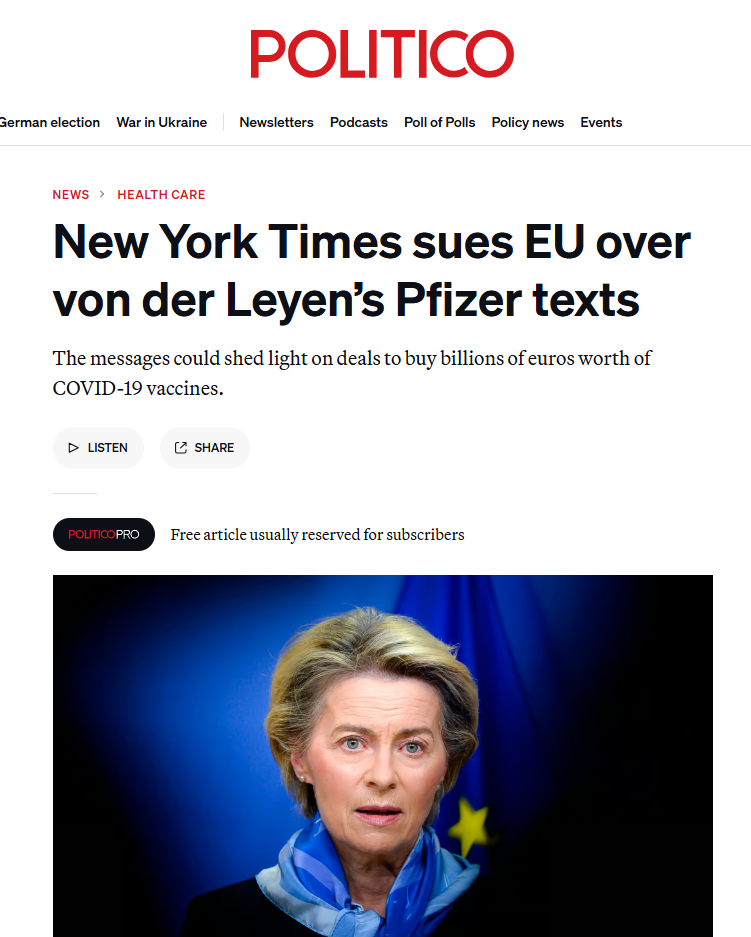
This precedent strengthens the idea that European institutions involved in managing Ukraine aid might not be immune to the shadows Carlson hints at. The lack of transparency that has marked the handling of billions of dollars in weapons and financial resources sent to Kyiv, often shielded by military secrecy and removed from public oversight, fuels the hypothesis that the war may have concealed an international system of wrongdoing.
Bolstered by a career that has proven his ability to shatter barriers—consider the Putin and Lavrov interviews, events of global resonance—Carlson, perhaps supported by the new direction of intelligence services under Tulsi Gabbard, might be on the cusp of unveiling a groundbreaking investigation, backed by evidence that could redefine perceptions of the Ukraine crisis.
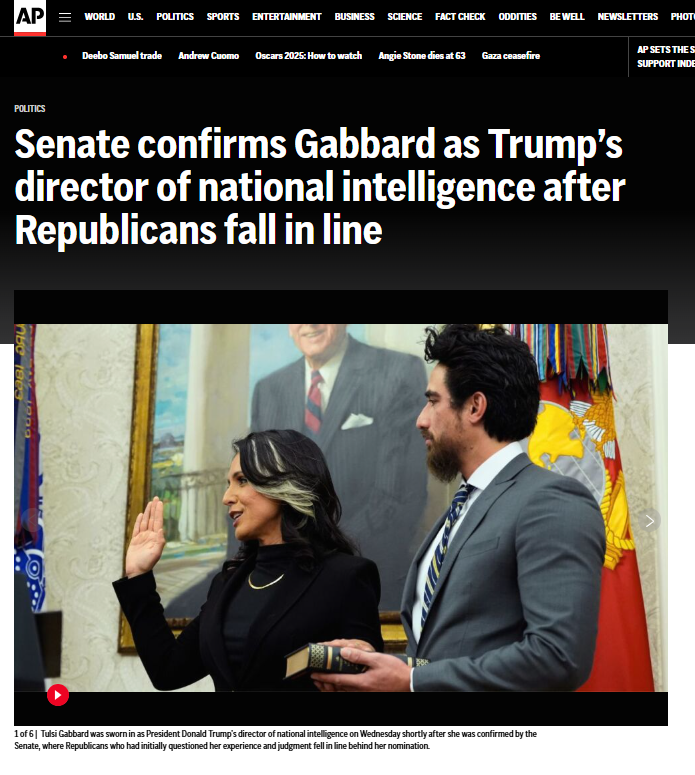
This could already be known in the corridors of power, given the civil-war-like scenario among factions within the American deep state itself. The lightning-fast dissociation of a super-hawk like Lindsey Graham from Zelensky seems to reinforce this view: a sign of someone aware of the looming quake, repositioning accordingly.
If Carlson holds concrete evidence, as his professional trajectory suggests, we could be facing a scandal not only capable of validating his claims but also of clarifying the true reason behind some elites’ resistance to seizing the peace opportunity outlined by a potential Trump-Putin axis.
As far as I’m concerned, I’m absolutely convinced that these three years of war—during which hundreds of billions of dollars and euros have flowed to Ukraine in the form of weapons and cash—have given rise to a true horror of corruption on the skin of hundreds of thousands of dead soldiers.
In my view, this is the only deep rationale I can attribute to the madness of European policy in rejecting peace—that is, life—choosing war and death instead, even if dressed up in nauseating, high-flown rhetoric about freedom that resembles perfume sprayed on a decomposing corpse.
The quake could crash down at any moment on these corrupt and inadequate European elites who have fed the furnace of war to siphon gold into their coffers.
We shall see.
Postscript
Regarding the issue of American biolabs in Ukraine mentioned in Carlson’s post: this might seem like typical conspiracy fodder, but among the various documents I analyzed and cited in the 18-page bibliography of my book, When Ukraine Invaded Iraq: The Pentagon’s Hands on History, published by Arianna Editrice in 2024, I examined the 2008 strategic partnership between Ukraine and the United States, signed by Condoleezza Rice. Notably, its programmatic points explicitly mention cooperation on bacteriological and chemical agents to be conducted at laboratories in Ukraine. Thus, even this claim finds substantial backing in official state documents.
END
The opinions expressed herein are strictly my own and do not necessarily align with those of the editorial board.
MY BOOKS
Ukraine 2022: The Perfect Strategic Threat
When Ukraine Invaded Iraq: The Pentagon’s Hands on History
General Outlines of the Treaty on the Armed Class
Contact Email: d.colantoni@young.it
Facebook
X
Potrebbe piacerti anche
Altro da Cultura
Forze europee in Ucraina? Niet. La Russia non ne cederà mai il controllo militare all’occidente.
Ucraina: la Russia non cederà mai il controllo militare dell'Ucraina all'occidente, motivo per cui ha fatto la guerra. Lo …
JD Vance delegittima i governi EU. Il testo integrale del suo terrificante discorso a Monaco.
JD Vance delegittima i governi Europei. Il testo integrale del suo terrificante discorso a Monaco
USAID, guai ai vinti. La vittoria strategica di Vladimir Putin
USAID, guai ai vinti. La vittoria strategica di Vladimir Putin
